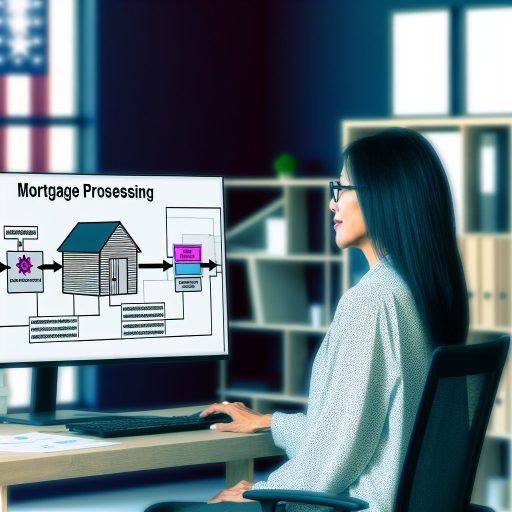Introduction to Smart Contracts in Real Estate
Smart contracts revolutionize transactions in real estate.
These digital contracts use blockchain technology for enhanced security.
They eliminate the need for intermediaries in real estate deals.
This innovation speeds up the transaction process significantly.
Traditionally, real estate transactions require multiple parties.
Buyers, sellers, agents, and lawyers typically participate in these deals.
However, smart contracts automate many of these roles.
As a result, this reduces costs and minimizes delays.
Smart contracts execute automatically when predefined conditions are met.
For instance, once a buyer deposits funds, ownership transfers automatically.
This process enhances trust between the parties involved.
Moreover, it provides transparency throughout the transaction.
Each transaction records a permanent blockchain entry.
This record is immutable and publicly accessible.
Consequently, parties can verify the history and details of the transaction.
Transform Your Real Estate Decisions
Unlock personalized real estate insights crafted just for you. Get actionable advice designed to amplify your success.
Get StartedSmart contracts also reduce the potential for fraud.
They ensure that funds and property transfer simultaneously.
In essence, these contracts define the terms and conditions involved.
They set clear expectations and responsibilities for all parties.
Moving forward, smart contracts will likely reshape the real estate landscape.
Their adoption will continue to grow as technology evolves.
Smart contracts present a streamlined approach to real estate transactions.
How Smart Contracts Work
Introduction to Blockchain Technology
Blockchain technology serves as the backbone of smart contracts.
It offers a secure and decentralized method for recording transactions.
In essence, blockchain acts as a digital ledger.
This ledger allows participants to verify transactions without a central authority.
Importantly, each transaction is grouped into blocks.
These blocks are then linked together chronologically.
The network updates automatically, ensuring everyone sees the same data.
Showcase Your Real Estate Business
Publish your company profile on our blog for just $200. Gain instant exposure and connect with a dedicated audience of real estate professionals and enthusiasts.
Publish Your ProfileComponents of Smart Contracts
Smart contracts consist of self-executing code.
This code runs on the blockchain when triggering conditions are met.
Additionally, smart contracts contain terms agreed upon by the involved parties.
They are transparent, tamper-proof, and automated.
As a result, smart contracts reduce reliance on intermediaries.
This aspect streamlines processes and cuts costs.
Smart Contracts in Real Estate
Real estate transactions often involve numerous entities.
Smart contracts simplify these processes by automating agreements.
For instance, property transfers can occur seamlessly upon payment.
Typically, parties can verify ownership and transaction histories instantly.
This transparency builds trust among buyers and sellers.
Benefits of Using Smart Contracts
- Enhanced security reduces the risk of fraud.
- Cost efficiency eliminates intermediary fees.
- Speed increases transaction processing times.
- Automation minimizes the potential for human error.
Challenges and Considerations
Despite their advantages, smart contracts face challenges.
Legal recognition may vary across jurisdictions.
Additionally, technical complexities can hinder adoption.
Finally, security vulnerabilities exist that require attention.
Benefits of Smart Contracts in Real Estate Transactions
Enhanced Transparency
Smart contracts provide a high level of transparency in real estate transactions.
All participants can access the same information simultaneously.
This reduces the risk of disputes related to miscommunication.
Increased Efficiency
With smart contracts, processes become significantly faster.
Automated tasks eliminate the need for manual interventions.
This efficiency accelerates the closing time of real estate deals.
Cost Reduction
Smart contracts lower transaction costs by minimizing intermediaries.
Fewer middlemen translate to reduced fees and commissions.
This allows buyers and sellers to save money on each deal.
Improved Security
Smart contracts utilize blockchain technology, enhancing security.
This decentralized system protects against data tampering.
All transactions are recorded securely and immutably.
Automation of Processes
Smart contracts automate various processes in real estate deals.
These include payment processing, title transfers, and escrow management.
Such automation minimizes human error and increases reliability.
Showcase Your Real Estate Business
Publish your company profile on our blog for just $200. Gain instant exposure and connect with a dedicated audience of real estate professionals and enthusiasts.
Publish Your ProfileAccess to Global Markets
Smart contracts facilitate cross-border real estate transactions.
This access opens new opportunities for buyers and sellers.
Consequently, it promotes a more diverse real estate market.
Discover More: IoT Home Surveillance for Property Protection
Challenges and Limitations of Implementing Smart Contracts
Technical Complexity
Smart contracts require significant technical expertise for successful implementation.
Developers must understand blockchain technology and programming languages.
This complexity can become a barrier for smaller real estate firms.
Moreover, technical issues may lead to costly delays in transactions.
Legal Recognition
The legal status of smart contracts remains ambiguous in many jurisdictions.
Real estate laws may not adequately cover blockchain transactions.
Consequently, parties might face challenges in enforcing smart contracts.
Legal disputes could arise, complicating the buying and selling process.
Integration with Existing Systems
Many real estate companies rely on traditional systems for transactions.
Integrating smart contracts into these systems presents significant hurdles.
Data migration and system compatibility must be carefully considered.
Failure to integrate can hinder operational efficiency.
Smart Contract Security
Security vulnerabilities in smart contracts pose significant risks.
Developers must rigorously test contracts to prevent exploits.
Incidents of hacking can lead to substantial financial losses.
Moreover, poor coding practices can create loopholes for malicious actors.
Market Education
The real estate market requires education on smart contracts.
Many stakeholders lack knowledge of blockchain technology and its benefits.
This information gap can slow widespread adoption of smart contracts.
Consequently, real estate professionals may stick to traditional methods.
Scalability Concerns
Smart contracts can face scalability issues as demand increases.
Network congestion can slow transaction speeds significantly.
This affects the overall efficiency and reliability of real estate transactions.
Scaling solutions are needed to ensure smooth operations during high demand.
Uncover the Details: Why Virtual Reality is Changing the Way Buyers Tour Homes
Case Studies: Successful Real Estate Transactions Using Smart Contracts
Introduction to Smart Contracts in Real Estate
Smart contracts automate and simplify real estate transactions.
Showcase Your Real Estate Business
Publish your company profile on our blog for just $200. Gain instant exposure and connect with a dedicated audience of real estate professionals and enthusiasts.
Publish Your ProfileThey utilize blockchain technology for increased efficiency and security.
This technology minimizes the risk of fraud and errors.
As a result, buyers and sellers benefit from a streamlined process.
Case Study: The Miami Beach Apartment Sale
In 2021, a luxury apartment in Miami Beach sold using a smart contract.
Both the buyer and seller agreed to the terms digitally.
The contract executed automatically once conditions were met.
This reduced closing times significantly.
Furthermore, it eliminated the need for intermediaries.
Thus, both parties saved time and money.
Case Study: A Commercial Property Deal in San Francisco
A major tech company purchased commercial space in San Francisco.
This deal involved a multi-million dollar investment.
Smart contracts ensured transparency throughout the transaction.
Each step of the deal was recorded on the blockchain.
This transparency built trust between all parties.
Additionally, it reduced disputes and legal issues.
Case Study: Residential Property Purchase in Austin
A family partnered with a real estate firm in Austin to buy a home.
They employed a smart contract to simplify the negotiation process.
The contract included specific conditions related to inspections.
Once the family approved the inspection, the contract executed automatically.
The entire process was efficient and user-friendly.
In contrast, traditional methods typically involve lengthy negotiations.
Benefits of Smart Contracts in Real Estate Transactions
- Increased efficiency and speed in closing deals.
- Enhanced security against fraud and manipulation.
- Reduction in transaction costs due to fewer intermediaries.
- Greater transparency leading to stronger trust among parties.
- Automation of compliance checks throughout the transaction.
Implications of Smart Contracts in Real Estate
These case studies demonstrate smart contracts’ potential in real estate.
As technology continues to evolve, more transactions will utilize smart contracts.
This trend promises to reshape the future of real estate deals.
You Might Also Like: How Cloud Technology is Revolutionizing Real Estate Collaboration

Comparative Analysis: Traditional Contracts vs Smart Contracts
Understanding Traditional Contracts
Traditional contracts involve manual processes and require physical signatures.
They typically include detailed terms and conditions negotiated by parties.
During transactions, these contracts rely on trusted intermediaries, like notaries.
Additionally, traditional contracts can be time-consuming and resource-intensive.
They are often prone to misunderstandings and disputes.
Showcase Your Real Estate Business
Publish your company profile on our blog for just $200. Gain instant exposure and connect with a dedicated audience of real estate professionals and enthusiasts.
Publish Your ProfileOverview of Smart Contracts
Smart contracts are self-executing agreements with terms coded into software.
They operate on decentralized blockchain networks, enhancing security and transparency.
These contracts automatically execute transactions when conditions are met.
Smart contracts significantly reduce the need for intermediaries, thus saving time.
Furthermore, they minimize the risk of disputes by providing clear execution protocols.
Speed and Efficiency
Traditional contracts can take weeks or even months to finalize.
In contrast, smart contracts execute instantly upon meeting predefined conditions.
This speed greatly enhances efficiency in real estate transactions.
Moreover, the automated nature of smart contracts reduces administrative workloads.
Security and Trust
Traditional contracts are vulnerable to forgery and misinterpretation.
Smart contracts enhance security through cryptographic techniques.
Moreover, blockchain technology provides an immutable record of all transactions.
This transparency fosters greater trust among involved parties.
Cost Implications
Engaging legal counsel for traditional contracts can be expensive.
This usually includes fees for notaries and other associated costs.
Smart contracts reduce these expenses significantly by eliminating intermediaries.
Although they require initial setup costs, the long-term savings are substantial.
Flexibility and Adaptability
Traditional contracts often lack flexibility in adapting to changes.
Amendments can be cumbersome and require re-negotiation.
Smart contracts allow for easier modification through coding updates.
This adaptability makes them suitable for dynamic real estate markets.
Discover More: Smart Home Technology For Voice-Activated Living Spaces
Future Trends: The Role of Smart Contracts in Real Estate Industry
Transforming Transactions
Smart contracts revolutionize real estate transactions.
They automate processes, reducing paperwork and errors.
This technology increases efficiency in closing deals.
Furthermore, it enhances trust between parties.
Improved Transparency
Smart contracts provide a transparent ledger of transactions.
They allow both buyers and sellers to track progress easily.
Consequently, this transparency minimizes disputes.
Additionally, it builds confidence in the transaction process.
Showcase Your Real Estate Business
Publish your company profile on our blog for just $200. Gain instant exposure and connect with a dedicated audience of real estate professionals and enthusiasts.
Publish Your ProfileCost Reduction
Using smart contracts reduces transaction costs significantly.
They eliminate the need for intermediaries, such as brokers.
Furthermore, this technology streamlines the entire process.
As a result, buyers and sellers can save money.
Enhanced Security
Smart contracts utilize blockchain technology for security.
This decentralized system protects against fraud.
Moreover, it secures sensitive information involved in deals.
Thus, participants can engage with peace of mind.
Future Adoption Trends
More real estate firms are embracing smart contracts.
As technology evolves, integration will become standard.
Consequently, the real estate industry will become more agile.
Additionally, more opportunities for innovation will arise.
Regulatory Considerations for Smart Contracts in Real Estate
Understanding Smart Contracts
Smart contracts automate agreement execution through code.
They operate on decentralized ledgers like blockchain.
Moreover, they enhance transparency and reduce the potential for fraud.
Current Regulatory Landscape
Regulatory bodies are gradually addressing smart contracts.
For example, agencies in the U.S. are exploring their implications.
This involves both financial and legal aspects of real estate transactions.
Legal Validity of Smart Contracts
Jurisdictions are still defining the legal status of smart contracts.
Some areas recognize them as legally binding agreements.
Others may require additional documentation or signatures.
Compliance with Existing Laws
Smart contracts must comply with local laws and regulations.
This includes regulations related to property rights and disclosures.
Additionally, data privacy laws are also applicable.
Consumer Protections
Consumer protection remains a significant concern in real estate.
Smart contracts should ensure fair treatment of all parties.
Overall protection mechanisms must be updated to include digital transactions.
Future Regulatory Developments
Regulations may evolve as technology advances.
Stakeholders will likely influence updates to existing laws.
With increased adoption, clearer guidelines are essential for smart contracts.
Showcase Your Real Estate Business
Publish your company profile on our blog for just $200. Gain instant exposure and connect with a dedicated audience of real estate professionals and enthusiasts.
Publish Your ProfileAdditional Resources
“Blockchain Technology in Commercial Real Estate: Developing a …




